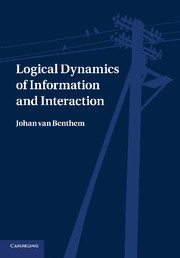Book contents
- Frontmatter
- Contents
- Preface
- Acknowledgments
- 1 Logical dynamics, agency, and intelligent interaction
- 2 Epistemic logic and semantic information
- 3 Dynamic logic of public observation
- 4 Multi-agent dynamic-epistemic logic
- 5 Dynamics of inference and awareness
- 6 Questions and issue management
- 7 Soft information, correction, and belief change
- 8 An encounter with probability
- 9 Preference statics and dynamics
- 10 Decisions, actions, and games
- 11 Processes over time
- 12 Epistemic group structure and collective agency
- 13 Logical dynamics in philosophy
- 14 Computation as conversation
- 15 Rational dynamics in game theory
- 16 Meeting cognitive realities
- 17 Conclusion
- References
- Index
Preface
Published online by Cambridge University Press: 07 October 2011
- Frontmatter
- Contents
- Preface
- Acknowledgments
- 1 Logical dynamics, agency, and intelligent interaction
- 2 Epistemic logic and semantic information
- 3 Dynamic logic of public observation
- 4 Multi-agent dynamic-epistemic logic
- 5 Dynamics of inference and awareness
- 6 Questions and issue management
- 7 Soft information, correction, and belief change
- 8 An encounter with probability
- 9 Preference statics and dynamics
- 10 Decisions, actions, and games
- 11 Processes over time
- 12 Epistemic group structure and collective agency
- 13 Logical dynamics in philosophy
- 14 Computation as conversation
- 15 Rational dynamics in game theory
- 16 Meeting cognitive realities
- 17 Conclusion
- References
- Index
Summary
Preface
This book is about Logical Dynamics, a theme that first gripped me in the late 1980s. The idea had many sources, but what it amounted to was this: make actions of language use and inference first-class citizens of logical theory, instead of studying just their products or data, such as sentences or proofs. My programme then became to explore the systematic repercussions of this ‘dynamic turn’. It makes its first appearance in my book Language in Action (1991), where categorial grammars are linked to procedures of linguistic analysis using relational algebra – viewing natural language as a sort of cognitive programming language for transforming information. My next book Exploring Logical Dynamics (1996) continued with this perspective, linking it to modal logic and process theories in computer science: in particular, dynamic logic of programs. This added new themes like process invariances and definability, dynamic inference, and computational complexity of logics. In the meantime, my view of logical dynamics has evolved again. I now see it as a general theory of agents that produce, transform, and convey information – and in all this, their social interaction should be understood just as much as their individual powers. Just think of this: asking a question and giving an answer is just as logical as drawing a conclusion on your own. And likewise, I would see argumentation with different players as a key notion of logic, with proof just a single-agent projection. This stance is a radical break with current habits, and I hope it will gradually grow on the reader, the way it did on me.
The book presents a unified account of the resulting agenda, in terms of dynamic-epistemic logic, a framework developed around 2000 by several authors. Many of its originators are found in my references and acknowledgments, as are others who helped shape this book. In this setting, I develop a systematic way of describing actions and events that are crucial to agency, and show how it works uniformly for observation-based knowledge update, inference, questions, belief revision, and preference change, all the way up to complex social scenarios over time, such as games. In doing so, I am not claiming that this approach solves all problems of agency, or that logic is the sole guardian of intelligent interaction. Philosophy, computer science, probability theory, or game theory have important things to say as well. But I do claim that logic has a long-standing art of choosing abstraction levels that are sparse and yet revealing. The perspective offered here is simple, illuminating, and a useful tool to have in your arsenal when studying foundations of cognitive behaviour. Moreover, the logical view that we develop has a certain mathematical elegance that can be appreciated even when the grand perspective leaves you cold. And if that technical appeal does not work either, I would already be happy if I could convey that the dynamic stance throws fresh light on many old things, helps us see new ones – and that it is fun!
- Type
- Chapter
- Information
- Logical Dynamics of Information and Interaction , pp. ix - xPublisher: Cambridge University PressPrint publication year: 2011

